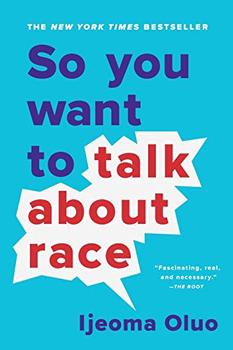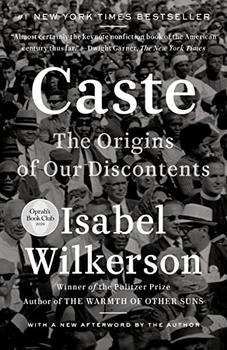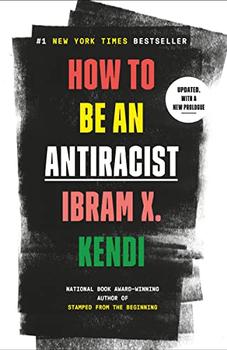Summary | Excerpt | Reading Guide | Reviews | Beyond the book | Read-Alikes | Genres & Themes | Author Bio

For the majority of people, having a meaningful conversation about race is not easy. In So You Want to Talk About Race, author Ijeoma Oluo, who is Black, recalls her own reluctance to have such a conversation with her white mother even after having launched a career writing and lecturing on race and racism. "This is not because my mom means any harm or is in any way a worse offender than those who approach me after speaking engagements or readings (she's not)," Oluo clarifies, "[I]t's just—she's my mom and nobody likes to discuss race with their mom."
What sets Oluo's book apart from other antiracist texts currently experiencing a popularity surge in conjunction with mass protests against police violence is that it makes the daunting task of conversation its focal point. The author doesn't only provide her audience with a brief but far-reaching education on the history of racism in the United States and how it applies to current politics and institutions, but bases this education around stumbling blocks that typically come up in discussions about race: sticking points, misunderstandings and fears that can be found in thousands upon thousands of heated interactions across the internet, office talk blunders and awkward family dinners. It's worth noting that Robin DiAngelo's White Fragility, a book that has shared recent bestseller territory with Oluo's, covers some of the same ground with a focus on white people's inability to discuss racism, but Oluo's book puts a broader focus on conversations about race and serves as more of a practical guide.
The book is divided up into chapters that address stumbling blocks individually. "Is it really about race?" points out how people sometimes attempt to derail conversations on race by raising concerns about other subjects, like gender and class. "Why am I always being told to 'check my privilege'?" dissects the concept of privilege and the worthwhile role examining it can play in anyone's understanding of how race functions in a social sense. Other chapters provide primers on additional topics related to race that are often misunderstood, including cultural appropriation, microaggressions (see Beyond the Book), the relationship between police brutality and race, the model minority myth, tone policing, intersectionality and the school-to-prison pipeline. The author doesn't only explain these issues, but also provides advice for discussing them, talking points and even tips for what to do when conversations become hostile and unproductive.
While Oluo's book could serve as a guide to having discussions on race for anyone, much of it is aimed at helping white people decenter their emotions and validating the oft-dismissed concerns of people of color. She shows understanding for the objections and insecurities white readers may bring to her book, but makes it clear that her intention is to focus not on feelings about race but on the reality of systemic racism. Later in the book, while discussing how Black Americans are often criticized for not being "nice enough" in advocating for equality, she elaborates on how a commitment to fighting racism should mean a commitment to fighting racism under all circumstances:
[I]f you believe in justice and equality you believe in it all of the time, for all people. You believe in it for newborn babies, you believe in it for single mothers, you believe in it for kids in the street, you believe in justice and equality for people you like and people you don't. You believe in it for people who don't say please.
Though Oluo makes a point of not sugar-coating justice issues or the amount of work they require, So You Want to Talk About Race is warm, personal and sometimes funny. The author introduces concepts through anecdotes from her own experiences, which range from infuriating to hilarious to sobering. As seems appropriate considering the subject of the book, she takes serious topics out of an academic context and places them in a conversational one, offering remarks along the lines of, "There is no shoving the four hundred years' racial oppression and violence toothpaste back in the toothpaste tube."
Some readers invariably will be (and have been) displeased with So You Want to Talk About Race for reasons that have nothing to do with its quality but simply the type of book it is. Like the conversations it seeks to improve, it will not bring about resolution or fulfillment on its own but requires effort on the reader's part. This is also not a book you should pick up for an in-depth account of racism in the U.S. or anywhere else, as many of the concepts presented are quite basic and geared towards application on a personal level rather than theory or history. However, it succeeds in being exactly what it intends to be: an insightful and honest guide for people struggling to talk to their family members, friends, neighbors and co-workers about race.
![]() This review
first ran in the June 24, 2020
issue of BookBrowse Recommends.
This review
first ran in the June 24, 2020
issue of BookBrowse Recommends.

If you liked So You Want to Talk About Race, try these:

by Isabel Wilkerson
Published 2023
The Pulitzer Prize–winning, bestselling author of The Warmth of Other Suns examines the unspoken caste system that has shaped America and shows how our lives today are still defined by a hierarchy of human divisions.

by Ibram X. Kendi
Published 2023
From the National Book Award–winning author of Stamped from the Beginning comes a bracingly original approach to understanding and uprooting racism and inequality in our society - and in ourselves.
Your guide toexceptional books
BookBrowse seeks out and recommends the best in contemporary fiction and nonfiction—books that not only engage and entertain but also deepen our understanding of ourselves and the world around us.